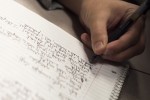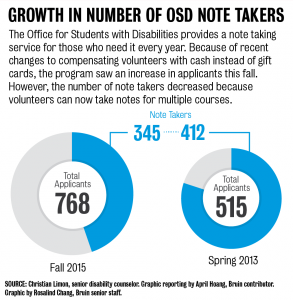This year, the Office for Students with Disabilities has adopted several changes, including a new payment method for its note-taking service and an online database of notes, to better serve students with disabilities and OSD volunteers.
The note-taking service allows students with various disabilities, whether temporary or permanent, to receive scanned copies of class notes from paid student volunteers. Any student enrolled in a class that needs a note-taker can apply for the position.
The new payment system, which was introduced last quarter, will pay student volunteers in cash deposits rather than recognition awards.
Students are now paid $80 for quarter-long classes and $120 for semester-based classes, said Christian Limon, senior disability counselor for OSD.
Under the previous system, which was introduced in spring 2013, the office paid volunteers one $75 gift card or BruinCard deposit per quarter, Limon said. Before that system was implemented, OSD paid students in stipends of $100 per class and $25 per discussion section.
Limon said he thinks the current system is the most beneficial of the three because it once again compensates volunteers for multiple courses per quarter, shortens payment delivery time and lifts previous limitations on how students can spend the money.
“With the stipend system, it went directly into their URSA accounts, which are like BruinBill accounts,” Limon said. “Any money they owed to UCLA could be deducted from the payment. With the recognition award system, volunteers could only get paid for one course per quarter.”
Since fall quarter, the OSD has received more than 700 applications for notetaker positions, about 250 more than in the 2013-2014 academic year.
Limon said he thinks interest in the program is increasing, but the program accepted fewer students this year because more volunteers are taking notes for multiple classes each quarter.
OSD Director Ed McCloskey said the program has undergone many improvements since he began working there in 1992. Most notably, OSD switched to an online database system called ClockWork in December 2014.
ClockWork allows students to access and submit notes remotely rather than having to visit the office each time, said Rachel Dawson, an OSD representative who coordinates the note-taking program.
The transition has been more convenient for students, and has helped the office save paper, McCloskey said. He added the online system also allows students to receive their notes as PDFs that they can enlarge, which helps those who are visually impaired.
McCloskey added he hopes OSD can continue to improve, by decreasing the time it takes students to receive notes.
Limon said OSD launched a pilot program last quarter to introduce Livescribe pens, which can capture audio and visual information. He added OSD has ordered 10 more pens and plans to obtain more in the future.
“OSD at UCLA has the largest note-taking program in the UC system,” Limon said. “Any time a change happens on this level, it’s pretty significant.”
Tarah Frost, a third-year linguistics and anthropology student who started volunteering last quarter, said the program has been rewarding and easy to participate in.
“The only extra effort I’m getting paid for is scanning my notes at the end of the week,” Frost said. “I thought it would be more arduous, but I didn’t have to change my routine at all.”
Frost said she was able to benefit from the program as much as the person she was taking notes for.
“I felt like my own notes improved because I was aware of the fact that someone else would be using them too,” she said. “I got to help someone who needed it, and it also meant that I would be having better notes for myself.”
Teena LeBeau, a fourth-year anthropology student who uses the service, said she thinks the program can still be improved because she often receives notes late.
“The notetakers sometimes waited to upload notes until the night before a test, so I often missed out on a week where I could have been studying,” LeBeau said.
Jack Chin, a part-time economics student who has been using the service for about a year, said he thinks the program allows students who use the notes to easily contact the volunteers.
“The notetakers are very good at responding if you want to request something like having them write thicker or darker,” Chin said.
He added students are sometimes allowed to use tape recorders in class, but he relies on the note-taking service for tasks like copying down graphs, which is an important part of his economics classes.
“I don’t think I could successfully go through school without it now,” Chin said. “The service is worth way more to me than $80 per quarter, and I don’t even have to pay for it myself.”
McCloskey added OSD will continue to make changes as needed to offer more options and better accommodate students.
“All students are welcome to stop by our office and let us know if there’s something we can help them out with, whether they have a disability or not,” McCloskey said.

